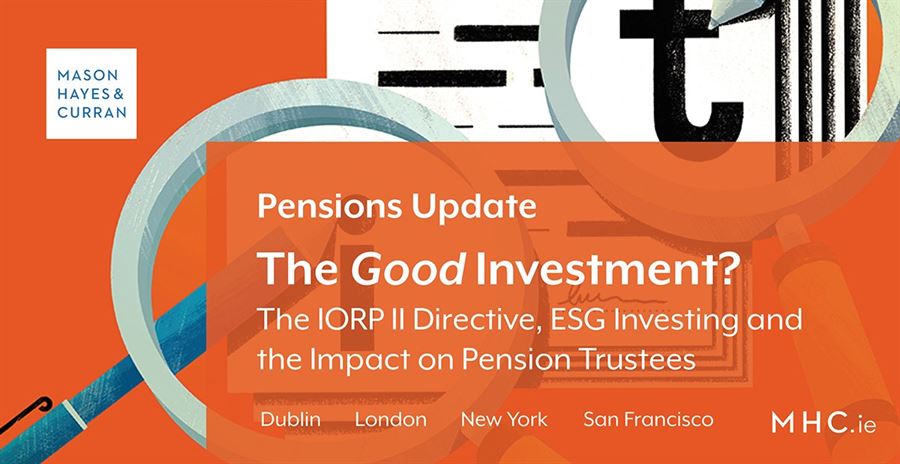
IORP II and ESG
Pension trustees have a wide range of fiduciary duties to the members of a pension scheme. These duties arise in common law, in statute and from the scheme documentation.
Article 19 of the IORP II Directive will add a further element for trustees to consider before making an investment decision. The Article provides that pension scheme investments should be made in accordance with the ‘prudent person’ rule. In broad terms, this rule means that a person or corporate, given discretion over the investment of another’s assets must only acquire investments or take risks with that account that a person of average intelligence would consider wise or prudent. Within that rule, pension schemes are permitted to focus on the long-term impact of their investment decisions on the environment, social issues, and corporate governance concerns, also known as ESG factors.
 Considering ESG factors
Considering ESG factors
Interestingly, Article 19 only requires that Member States do not ban the consideration of ESG factors when investment decisions are being made. The consideration of ESG factors is not mandatory. It is enough for trustees to explain in a scheme’s statement of investment policy principles that ESG factors have not been taken into account and why that approach has been adopted. It can be stated, for instance, that those factors were simply not considered or that the costs of monitoring and reviewing ESG factors are disproportionate to the size of the fund.
Risk v reward
However, where the trustees of a pension scheme opt to consider ESG factors before making investment decision, then the trustees should have in place adequate risk management policies and procedures to assess those factors before purchasing a particular security or adopting a proposed investment strategy. It should also be noted that where an ESG risk assessment is done, this information will need to be disclosed to current and prospective scheme members.
While there is a broader ethical focus in the inclusion of this ESG provision in IORP II, it is also concerned with the potential impact on pension scheme values. In recent years, where companies has been involved in environmental disasters, or where human rights abuses have come to light, the share prices of companies involved have been drastically impacted. From that perspective, the ESG provision in IORP II works well with standard risk categories, such as market risk, counterparty default risk, and reputational risk.
Conclusion
Trustees of occupational pension schemes and one member arrangements should be aware of the Irish transposing legislation for IORP II to see how the provision relating to ESG factors has been replicated and to give consideration to what their next steps should be. IORP II brings significant additional obligations for trustees and employers and the Pensions Authority has stated that its focus will be on the risks of non-compliance.
For more information on the impact of IORP II on pension trustees and their future investment strategies, contact a member of our Pensions team.
The content of this article is provided for information purposes only and does not constitute legal or other advice.






